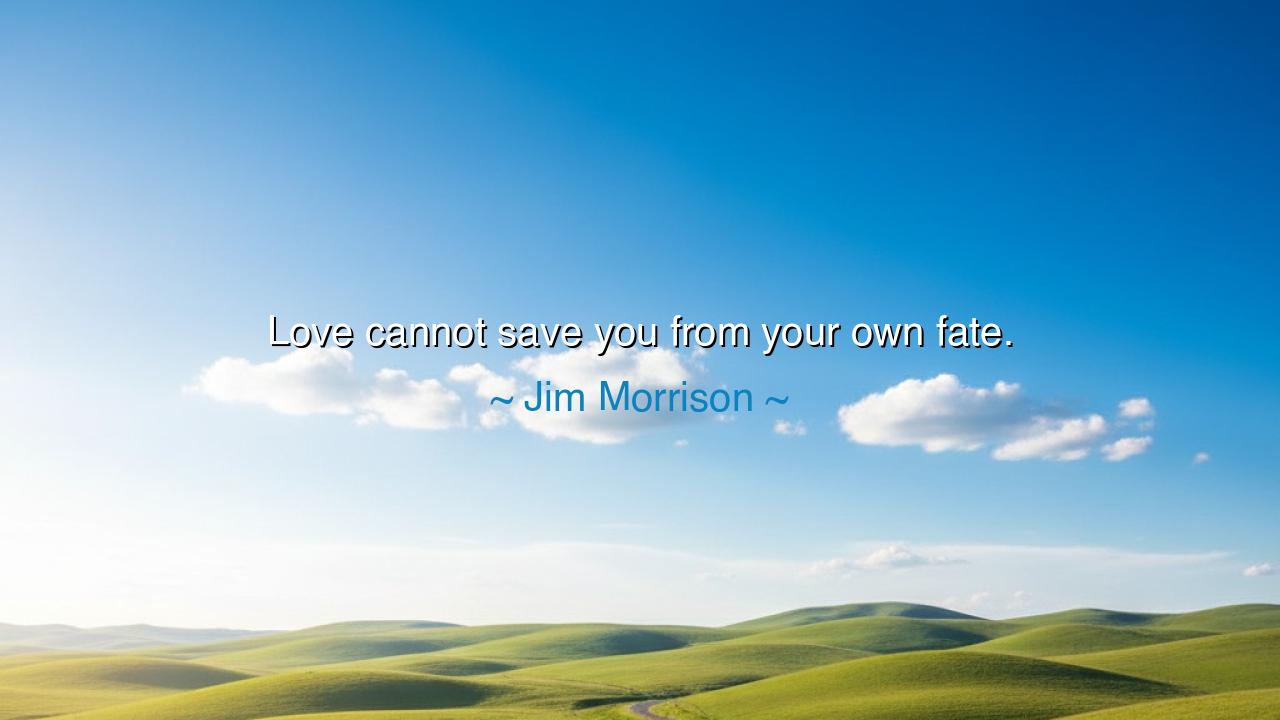
Love cannot save you from your own fate.






“Love cannot save you from your own fate.” — These haunting words of Jim Morrison, the poet and prophet of a restless age, resound like a whisper from the edge of eternity. They are not the confession of a cynic, but the revelation of a man who walked through fire and shadow, who tasted both the ecstasy of love and the inevitability of destiny. In them lies a truth as old as humanity itself: that love, though divine and powerful, cannot shield us from the path we are born to walk, nor erase the trials that our soul must endure. Love is not a fortress against fate — it is the light that helps us see through its darkness.
Morrison, lead singer of The Doors and poet of the turbulent 1960s, was a man who lived as if every moment burned with cosmic significance. He loved fiercely, lived recklessly, and sought transcendence through art, music, and passion. Yet beneath the wildness, he carried an awareness of life’s tragic pattern — that no matter how deeply we are loved, or how deeply we love another, there are destinies that even love cannot alter. His own life was a testament to this truth: though adored by millions, and cherished by those closest to him, Morrison’s inner storms and relentless pursuit of freedom led him down a path that no affection could redirect. At twenty-seven, his body gave way, but his words remained — carved in the immortal language of art.
In saying that love cannot save you from your own fate, Morrison did not deny the power of love. Rather, he gave it a more sacred and sobering meaning. He saw that love is not a rescuer but a companion; not a cure for destiny, but a witness to it. Love may walk beside us through pain, but it cannot walk for us. Each soul must meet its own challenges, confront its own shadows, and fulfill its own journey through the corridors of life. To expect love to erase suffering is to misunderstand its nature; love does not remove the cross — it helps us bear it.
History is filled with the echoes of this truth. Consider the story of Romeo and Juliet, whose love burned bright enough to defy their families’ hatred, yet could not escape the cruel machinery of fate. Their passion was pure, their devotion unyielding, and yet love could not undo the consequences of their world’s divisions. It could not save them from misunderstanding, from timing, from death. In their tragedy lies Morrison’s warning — that even the noblest of loves cannot rewrite the stars. Fate is the thread upon which all hearts are strung; and though love may shine upon it, the pattern remains.
Yet there is wisdom and liberation in this realization. When we accept that love cannot save us from fate, we cease demanding that it should. We stop expecting our lovers, our families, our friendships to complete or protect us from the storms of existence. We begin to see love as it truly is — not a shield, but a mirror. It reveals who we are beneath our illusions. It teaches us tenderness, courage, and surrender. Love may not save us from death, loss, or failure, but it transforms how we endure them. It gives meaning to our suffering, and grace to our destiny.
Morrison’s words, then, are not a lament, but a kind of initiation — a call to maturity of the soul. To live is to accept that life will break us in ways we cannot predict. To love is to give the heart fully, knowing it may not be enough to change what must be. But it is still worth it. For though love cannot save us from fate, it can make us face it with open eyes and an unbroken spirit. It turns tragedy into beauty, mortality into art, and endings into beginnings.
So, dear listener, take this teaching to heart: do not seek salvation in another’s arms, nor blame love when pain comes. Love deeply, but do not cling; give freely, but do not expect deliverance. Your fate is the path your soul must walk — but love can be the song that accompanies you upon it. Let it soften your steps, not spare you from walking. Let it illumine your darkness, not erase it. For when you love without demanding rescue, you discover the greatest truth of all: that fate can claim the body, but never the soul that has learned to love.
This is the legacy of Morrison’s wisdom — that love is not the escape from destiny, but the fire that gives it meaning. Embrace your journey, whatever storms it brings, and let love guide you through them — not as your savior, but as your companion, your muse, and your crown.






AAdministratorAdministrator
Welcome, honored guests. Please leave a comment, we will respond soon